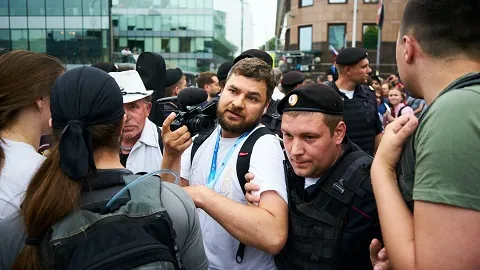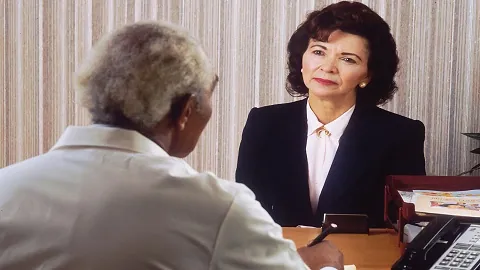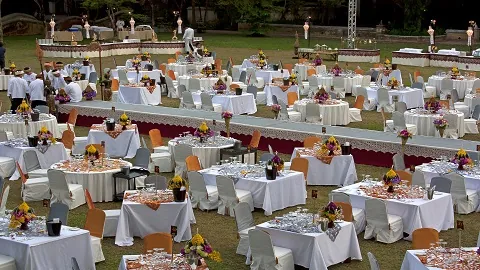Communications Manager Career
As a communications manager in events management, you'll play a pivotal role in orchestrating successful events.
Developing and executing strategic communication plans, ensuring clear and consistent messaging, enhancing attendee experiences – just a few of the tasks you’ll be handling on a day-to-day basis. From small-scale gatherings to large events, your creative communication strategies will play a key role in driving engagement and contributing to every project’s overall success.
- Introduction
- Typical Job Responsibilities
- Standard Work Environment
- Suggested Work Experience
- Recommended Qualifications
- Projected Career Map
- Beneficial Professional Development
- Learn More
- Conclusion
As a communications manager in events management, your role is to be the communication linchpin behind the scenes. You oversee the entire communication lifecycle of events, from conceptualisation to execution. Your responsibilities encompass developing and executing strategic communication plans, coordinating with various stakeholders, and ensuring that the event's messaging is clear and consistent. Crafting impactful promotional materials, managing communication budgets, and analysing post-event data to gather insights are all part of your job. Your ultimate goal is to drive engagement, enhance the experience for attendees, and contribute to the overall success of the event.
Communications Manager Career
As a communications manager in events management, you'll play a pivotal role in orchestrating successful events.
Developing and executing strategic communication plans, ensuring clear and consistent messaging, enhancing attendee experiences – just a few of the tasks you’ll be handling on a day-to-day basis. From small-scale gatherings to large events, your creative communication strategies will play a key role in driving engagement and contributing to every project’s overall success.
As a communications manager in events management, your role is to be the communication linchpin behind the scenes. You oversee the entire communication lifecycle of events, from conceptualisation to execution. Your responsibilities encompass developing and executing strategic communication plans, coordinating with various stakeholders, and ensuring that the event's messaging is clear and consistent. Crafting impactful promotional materials, managing communication budgets, and analysing post-event data to gather insights are all part of your job. Your ultimate goal is to drive engagement, enhance the experience for attendees, and contribute to the overall success of the event.
Communications managers in events management typically operate in dynamic office settings, where they collaborate with diverse teams. They often visit event venues for planning and onsite communication management. Adaptability and flexibility are key attributes, as the role may require you to work flexible hours, especially during peak event periods. Utilising technology for communication and project management is a regular part of your routine. Your work environment combines creativity, strategic thinking, and precision to deliver successful and memorable experiences.
Ideal candidates for this role should have at least 3+ years of progressive experience in communication and events management roles. Demonstrated success in planning and executing various events, from small-scale to large-scale, is a valuable asset. Previous responsibilities for budget allocation, stakeholder coordination, and team leadership are essential. A track record of driving engagement and enhancing attendee experiences through innovative communication strategies, coupled with proficiency in data-driven decision-making, ensures effective contributions to the role.
While a bachelor’s degree in communication, public relations, or event management is beneficial, it's not always essential. An endorsed certificate or diploma in a related field will help you get that initial foot in the door, and attract the attention of employers. A strong portfolio showcasing successful event communication campaigns and strategic initiatives is invaluable to climb the leadership ladder. Proven leadership abilities, effective communication, and a deep understanding of communication principles are key. Proficiency in relevant software tools and analytics platforms is essential. A passion for creativity, meticulous planning, and a results-driven mind-set are equally vital.
Your career journey in events management communication may begin as a communication coordinator or public relations assistant, where you gain hands-on experience in communication strategies for events. Progressing to roles like communication manager, you'll oversee larger projects and teams. Advancing to senior communications manager, you'll lead complex campaigns and strategy development. Ultimately, you can work towards the position of communications director or chief communications officer, with responsibility for high-level decision-making, organisation-wide branding, and driving engagement through innovative communication strategies.
Continued education in event communication and obtaining certifications is a valuable investment in your career. Mastering data analytics and communication automation tools will give you a competitive edge. Attending industry conferences and workshops to stay updated on emerging trends is essential. Developing leadership skills through management courses will enable you to lead teams effectively. Engaging in cross-functional training to enhance collaboration is recommended. Seeking mentorship from seasoned professionals can provide invaluable guidance. Exploring digital marketing advancements and honing communication expertise for effective team and stakeholder interaction are crucial for sustaining growth and excellence in your events management communication career.
Embarking on a career as a Communications Manager is a dynamic journey that involves crafting and delivering compelling messages to enhance an organization's reputation. Here's a succinct overview:
- Strategic Communications Planning: Communications Managers excel in strategic planning, developing comprehensive communication plans aligned with organizational goals to effectively convey key messages.
- Media Relations: Proficient in media relations, Communications Managers establish and maintain relationships with media outlets, ensuring positive coverage and managing crisis communications when necessary.
- Content Development: Demonstrating expertise in content development, Communications Managers create compelling written and visual content for various channels, including press releases, articles, and social media.
- Brand Messaging: Effectively managing brand messaging, Communications Managers ensure consistency in communication, reinforcing the organization's values and positioning in the market.
- Crisis Communication: Demonstrating crisis communication skills, Communications Managers respond promptly and effectively to unexpected events, mitigating negative impacts on the organization's reputation.
- Internal Communication: Facilitating internal communication, Communications Managers ensure that employees are informed and engaged, fostering a cohesive and informed workforce.
- Digital Communication Proficiency: Adapting to digital communication trends, Communications Managers leverage digital platforms, social media, and other online channels to reach diverse audiences effectively.
- Stakeholder Engagement: Building and maintaining positive relationships with stakeholders, including clients, employees, and the community, Communications Managers ensure alignment and support for organizational goals.
- Public Speaking and Presentation Skills: Demonstrating strong public speaking and presentation skills, Communications Managers effectively represent the organization in public forums and media interviews.
- Data Analytics: Utilizing data analytics, Communications Managers measure the effectiveness of communication strategies, gather insights, and adjust approaches to achieve optimal results.
- Personal Traits for Communications Manager: Professionalism, effective communication, strategic thinking, adaptability, leadership, creativity, resilience, attention to detail, teamwork, and a passion for maintaining and enhancing the organization's reputation collectively define a successful career as a Communications Manager.
The communications manager in events management plays a critical role in delivering successful and memorable events. By orchestrating effective communication strategies, enhancing attendee experiences, and driving engagement, professionals in this role contribute significantly to the overall success of events while continuously evolving in a thriving industry. If you have a passion for crafting communication solutions and ensuring event success, this career path offers fulfilling and exciting opportunities in the events management sector.

































